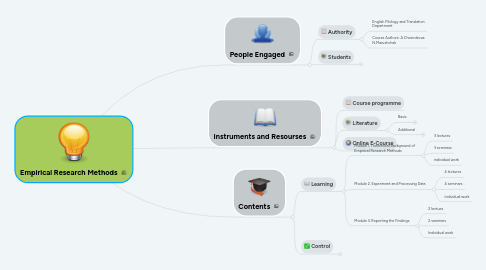
1. People Engaged
1.1. Authority
1.1.1. English Pilology and Translation Department
1.1.2. Course Authors: A.Chesnokova; N.Marushchak
1.2. Students
1.2.1. 6th year students of Language and Literature MA Programme
2. Instruments and Resourses
2.1. Course programme
2.2. Literature
2.2.1. Basic
2.2.1.1. 1. Чеснокова Г. В. Як виміряти враження від поезії або Вступ до емпіричних методів дослідження у мовознавстві : [монографія] / Ганна Вадимівна Чеснокова. – К. : Ленвіт, 2011. – 248 с.
2.2.1.2. 2. Chesnokova A. Quantitative Research in Practice: Applying a Differential Scale Questionnaire to Literature / A. Chesnokova, V. Viana, S. Zyngier, J. Jandre, S. Nero. [Електронний ресурс] // Вісник Сумського державного університету. Серія Філологічні трактати. – 2009. – Том 1. – Випуск 3–4. – С. 67–77. – Режим доступу : Сучасні проблеми перекладу
2.2.1.3. 3. van Peer W. Stylistics and Psychology. Investigation of Foregrounding / Willie van Peer. – London : Croom Helm, 1986. – 220 р.
2.2.1.4. 4. van Peer W. Muses and Measures: Empirical Research Methods for the Humanities / W. van Peer, J. Hakemulder, S. Zyngier. – Newcastle : Cambridge Scholars Publishing, 2007. – 390 p.
2.2.1.5. 5. van Peer W. Scientific Methods for the Humanities / W. van Peer, J. Hakemulder, S. Zyngier. – Amsterdam, Philadelphia : John Benjamins, 2012. – 328 p.
2.2.2. Additional
2.2.2.1. 1. Рибінська Ю. Психологічні особливості сприйняття інокультурного твору в оригіналі та перекладі / Ю. Рибінська // матеріали Міжнародного науково-методичного семінару ["Актуальні проблеми сучасного художнього і галузевого перекладу"], (Горлівка, 16–17 лютого 2007 р.) / Горлівський державний педагогічний інститут іноземних мов. – Горлівка: Видавництво ГДПІІМ, 2007. – С. 133–142.
2.2.2.2. 2. Чеснокова Г. В. Лексичний повтор у контексті теорії поетичної компетенції: емпірична розвідка / Г. В. Чеснокова // Наукові праці Кам’янець-Подільського державного університету: Філологічні науки. – 2007. – Випуск 15. – Том 1. – Кам’янець-Подільський: Аксіома. – С. 235–238.
2.2.2.3. 3. Al-Hindawe J. Considerations When Constructing a Semantic Differential Scale / J. Al-Hindawe [Електронний ресурс] // La Trobe Papers in Linguistics. – 1996. – № 9. – Режим доступу : http://arrow.latrobe.edu.au:8080/vital/access/services/Download/latrobe:33069/SOURCE1?view=true .
2.2.2.4. 4. Andringa E. Literature: Empirical Studies / E. Adringa // The Encyclopedia of Language and Linguistics / [ed. by R. Asher]. – Volume 4. – Oxford : Pergamon Press, 1994. – P. 2266–2271.
2.2.2.5. 5. Andringa E. Perspektivierung und Perspektivenübernahme: Zur Wahrnehmung literarischer Figuren / E. Andringa // Spiel. – 1986. – № 5. – S. 135–146.
2.2.2.6. 6. Balnaves M., Caputi P. Introduction to Quantitative Research Methods. An Investigative Approach / M. Balnaves, P. Caputi. – London, Thousand Oaks, New Delhi : Sage Publications, 2001. – 258 p.
2.2.2.7. 7. Barsch A. The Empirical Theory of Literature – Current Aspects / A. Barsch // Conhecimento e Imaginação / [ed. by S. Zyngier, P. A .do Prado, R. M. de Britto Figueiredo]. – Rio de Janeiro : UFRJ, 2001. – P. 32–41.
2.2.2.8. 8. Beaugrande de R. The Naive Reader: Anarchy or Self-Reliance / R. de Beaugrande // Empirical Studies of the Arts. – 1987. – Volume 5. – № 2. – P. 145–169.
2.2.2.9. 9. Bower G. H. Experiments on Story Comprehension and Recall [Електронний ресурс] / G. H. Bower // Discourse Processes. – 1978. – № 1. – P. 211–231. – Режим доступу : http://www.tandfonline.com/doi/abs/10.1080/01638537809544437
2.2.2.10. 10. Chesnokova A. Budding Researchers in the Humanities: An Intercultural Online Project / A. Chesnokova, S. Zyngier, V. Viana, W. van Peer // Cases on Distance Delivery and Learning Outcomes: Emerging Trends and Programs / [ed. by D. Gearhart]. – Hershey : IGI Global, 2009. – P. 231–244.
2.2.2.11. 11. Chesnokova A. Reading Dickinson: Identification and Cultural Stereotypes / A. Chesnokova, M. Mendes // Вісник кафедри UNESCO. – Філологія. Педагогіка. Психологія. – 2006. – № 12. – С. 150–154.
2.2.2.12. 12. Cialdini R. B. Social Influence: Compliance and Conformity / R. B. Cialdini, N. J. Goldstein // Annual Review of Psychology. – 2004. – № 55. – P. 591–621.
2.2.2.13. 13. Dias P. X. Reading and Responding to Poetry / Patrick X. Dias. – Portsmouth : Boynton / Cook Publishers, Heinemann, 1996. – 124 p.
2.2.2.14. 14. Eco U. The Role of the Reader: Explorations in the Semiotics of Texts / Umberto Eco. – London : Hutchinson, 1984. – 284 p.
2.2.2.15. 15. Fish S. E. How To Recognize a Poem When You See One / S. E. Fish // Is There a Text in this Class?: The Authority of Interpretive Communities. – Cambridge, London : Harvard University Press, 1980. – P. 322–337.
2.2.2.16. 16. Graesser A. C. An Automated Text Analysis: Willie van Peer’s Academic Contributions / A. C. Graesser, B. Morgan // Directions in Empirical Literary Studies / [ed. by S. Zyngier, M. Bortolussi, A. Chesnokova, J. Auracher]. – Amsterdam, Philadelphia : John Benjamins, 2008. – P. 161–173.
2.3. Online E-Course
3. Contents
3.1. Learning
3.1.1. Module 1. Theoretical Background of Empirical Research Methods
3.1.1.1. 3 lectures
3.1.1.2. 3 seminars
3.1.1.3. individual work
3.1.2. Module 2. Experiment and Processing Data
3.1.2.1. 4 lectures
3.1.2.2. 4 seminars
3.1.2.3. individual work
3.1.3. Module 3. Reporting the Findings
3.1.3.1. 2 lectues
3.1.3.2. 2 seminars
3.1.3.3. Individual work
3.2. Control
3.2.1. Module Test 1
3.2.2. Module Test 2
3.2.3. Module Test 3
3.2.4. EXAM
